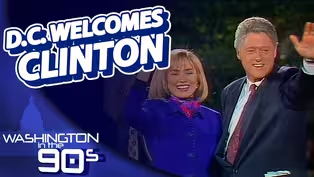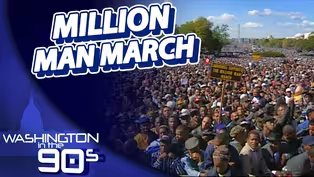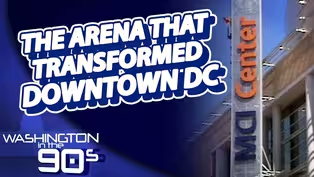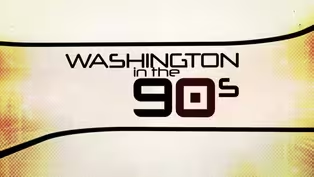How the Arrival of Capital One Arena Revitalized Downtown DC
Clip | 3m 43sVideo has Closed Captions
In the 1990s, downtown Washington experienced a rebirth with the opening of MCI Center.
The arrival of the Shakespeare Theatre Company in Downtown Washington, DC began a process of revitalization for the neighborhood now known as DC's Chinatown. But when the city broke ground on the MCI Arena — now Capital One Arena — in 1995, the neighborhood really took off. Popular DC Mayor Marion Barry was a driving force for the project, partnering with DC real estate magnate Abe Pollin.
Problems playing video? | Closed Captioning Feedback
Problems playing video? | Closed Captioning Feedback
How the Arrival of Capital One Arena Revitalized Downtown DC
Clip | 3m 43sVideo has Closed Captions
The arrival of the Shakespeare Theatre Company in Downtown Washington, DC began a process of revitalization for the neighborhood now known as DC's Chinatown. But when the city broke ground on the MCI Arena — now Capital One Arena — in 1995, the neighborhood really took off. Popular DC Mayor Marion Barry was a driving force for the project, partnering with DC real estate magnate Abe Pollin.
Problems playing video? | Closed Captioning Feedback
How to Watch
is available to stream on pbs.org and the free PBS App, available on iPhone, Apple TV, Android TV, Android smartphones, Amazon Fire TV, Amazon Fire Tablet, Roku, Samsung Smart TV, and Vizio.
♪ ♪ NARRATOR: When the Shakespeare Theater Company moved from Capitol Hill to the abandoned Lansburgh's Department Store in 1992, it seeded downtown's revitalization.
But by mid-decade, much of Washington's downtown remained empty.
SETH: It was still a wild west down there in the old days, people offering to watch your car for a nominal fee.
Help you park, even though you knew how to park perfectly well.
TED: There was certainly nothing to do, to eat before or afterwards.
I mean, it's amazing when you explain that to somebody today.
NARRATOR: In 1995, the city broke ground on the MCI Center.
ANTHONY: A lot of that happening was Marion Barry.
Most developers would tell you this about Marion Barry, when he put his mind on something, it would happen.
CORA: Marion Barry knew how to do business.
If you stop and you look at the MCI Arena, or you go to the waterfront in Georgetown, "Oh, that's Marion Barry."
He was able to work with developers.
TOM: That was the appeal of Barry, he very popularly would say, "I'm both good in the streets and the suites."
NARRATOR: The other man behind the new arena: Abe Pollin.
TED: Where Mr. Pollin was a visionary and a genius, was from saying, I will move the arena from the less expensive land out in Maryland to an area of the city that when people first heard where the arena was going to go, said this won't work.
GEOFF: His devotion to the city and his commitment to building that building and to taking on a big financial burden to do it was impressive.
He was a local guy.
He made his money in DC and he was committed to making something big happen.
NARRATOR: The arena threw open its gates on December 2nd, 1997.
REPORTER: The newly christened Fun Street lived up to its name as hundreds lined the block in front of the MCI Center to watch as a fife and drum band led the opening day parade.
ABE: It's a fantastic day, a fantastic day.
I think I'm floating around, but I mean, after five years of hoping and planning and overcoming frustration and whatever, and to see it come to fruition, it's just a day of, a day of joy really.
NARRATOR: The arena, affectionately nicknamed "The Phone Booth," transformed its surroundings almost overnight.
GEOFF: All of a sudden it was green light go for opening restaurants and night spots, and it radiated out across that part of DC instantly.
Walking up and down 7th Street at night with bright lights on and crowds of people who were happy to be there was a new experience.
NARRATOR: Professional basketball and hockey came to downtown.
TED: One of the things that earmarks a great community is sports teams.
COMMENTATOR: Adam Oates turning.
Oates in, blocked, covered, he scores.
NARRATOR: The Washington Capitals made the 1998 Stanley Cup finals.
Later that year, the Washington Mystics tipped off for the first time.
And the Washington Bullets arrived in town, sporting a new name on their jerseys.
ANNOUNCER: For more clips, and to watch the full program, visit weta.org/decades.
When the AOL Boom Turned DC into Silicon Valley
Video has Closed Captions
Clip | 2m 20s | Discover AOL's remarkable rise from a start-up to a global Internet sensation. (2m 20s)
When DC Embraced the Newly-Elected Bill Clinton
Video has Closed Captions
Clip | 1m 51s | President Clinton brought a sense of youthful energy to the nation's capital in 1993. (1m 51s)
Sharon Pratt Became DC's First Black Female Mayor
Video has Closed Captions
Clip | 2m 28s | In 1990, Sharon Pratt Dixon emerged as a formidable candidate for the mayoral race. (2m 28s)
Video has Closed Captions
Clip | 3m 32s | In May 1991, simmering tensions between police and Latinx refugees boiled over. (3m 32s)
The Million Man March Brought Love and Brotherhood to DC
Video has Closed Captions
Clip | 2m 30s | Tthe Million Man March in 1995 captured the nation's attention. (2m 30s)
How the Arrival of Capital One Arena Revitalized Downtown DC
Video has Closed Captions
Clip | 3m 43s | In the 1990s, downtown Washington experienced a rebirth with the opening of MCI Center. (3m 43s)
Video has Closed Captions
Clip | 2m 1s | The storm of the decade dumped over 17 inches of snow on Washington, January 6-8, 1996. (2m 1s)
Video has Closed Captions
Clip | 2m 26s | In January 1990, Mayor Marion Barry was arrested in an FBI sting operation. (2m 26s)
Video has Closed Captions
Clip | 2m 32s | Facing competition from new venues like The Black Cat, the 9:30 Club was forced to move. (2m 32s)
Preview: Washington in the '90s
Preview: Special | 30s | WETA TV 26 recounts the major events, people, and hot spots of 1990s Washington, D.C. (30s)
Providing Support for PBS.org
Learn Moreabout PBS online sponsorshipSupport for PBS provided by:

























